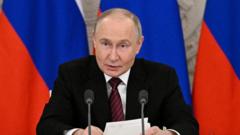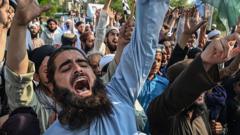Morgan Ortagus, the U.S. deputy envoy for the Middle East, visited Lebanon to discuss mounting tensions with Israel and the fragile peace established after a devastating conflict.
Trump Envoy in Lebanon: Navigating Tensions Amid Truce with Israel

Trump Envoy in Lebanon: Navigating Tensions Amid Truce with Israel
U.S. envoy Morgan Ortagus meets Lebanese officials as tensions rise with Israel despite a fragile cease-fire.
In Beirut, April 5, 2025 - Morgan Ortagus, the deputy Middle East envoy under President Trump, has arrived in Lebanon amidst pressure from the U.S. for the Lebanese government to take action against Hezbollah. This visit comes as tensions between Israel and Hezbollah threaten to undermine a U.S.-brokered cease-fire that was implemented last November.
During her visit, Ortagus engaged in discussions with key government figures including Lebanon's newly appointed President, Joseph Aoun. These talks encompassed various topics, primarily focusing on the situation in southern Lebanon. Under the terms of the cease-fire, the Lebanese army was expected to assume control in areas long influenced by Hezbollah, which has been significantly weakened following its recent conflict with Israel that resulted in a staggering loss of around 4,000 lives and displaced approximately one million people.
Recent weeks have seen increasing hostilities, with militants launching rockets into Israel, prompting an Israeli response that included bombings on the outskirts of the Lebanese capital and southern regions. The Israeli military later targeted areas in Dahiya, south of Beirut, linked to Hezbollah, raising concerns over the stability of the cease-fire.
Hezbollah, however, has distanced itself from the rocket attacks, and as of now, both Israel and Hezbollah appear reluctant to escalate into full-blown war once more. Despite the prevailing tensions, the cease-fire remains intact for the time being.
Ortagus’s agenda also included dialogue about Lebanon's economic reforms introduced by the new government, which Lebanon hopes will attract foreign aid essential for rebuilding the war-torn country. The World Bank has assessed the economic toll of the conflict to be around $14 billion, with an estimated $11 billion required for rehabilitation efforts, classifying it as Lebanon's most severe catastrophe since its civil war concluded in 1990.
The future of international support for Lebanon hinges heavily on the government's ability to exert control and stabilize the country, particularly regarding the disarmament of Hezbollah, which had historically wielded power comparable to a state itself within Lebanon.
Aaron Boxerman is a reporter for the Times, focusing on Israel and the Gaza region, and is based in Jerusalem.
During her visit, Ortagus engaged in discussions with key government figures including Lebanon's newly appointed President, Joseph Aoun. These talks encompassed various topics, primarily focusing on the situation in southern Lebanon. Under the terms of the cease-fire, the Lebanese army was expected to assume control in areas long influenced by Hezbollah, which has been significantly weakened following its recent conflict with Israel that resulted in a staggering loss of around 4,000 lives and displaced approximately one million people.
Recent weeks have seen increasing hostilities, with militants launching rockets into Israel, prompting an Israeli response that included bombings on the outskirts of the Lebanese capital and southern regions. The Israeli military later targeted areas in Dahiya, south of Beirut, linked to Hezbollah, raising concerns over the stability of the cease-fire.
Hezbollah, however, has distanced itself from the rocket attacks, and as of now, both Israel and Hezbollah appear reluctant to escalate into full-blown war once more. Despite the prevailing tensions, the cease-fire remains intact for the time being.
Ortagus’s agenda also included dialogue about Lebanon's economic reforms introduced by the new government, which Lebanon hopes will attract foreign aid essential for rebuilding the war-torn country. The World Bank has assessed the economic toll of the conflict to be around $14 billion, with an estimated $11 billion required for rehabilitation efforts, classifying it as Lebanon's most severe catastrophe since its civil war concluded in 1990.
The future of international support for Lebanon hinges heavily on the government's ability to exert control and stabilize the country, particularly regarding the disarmament of Hezbollah, which had historically wielded power comparable to a state itself within Lebanon.
Aaron Boxerman is a reporter for the Times, focusing on Israel and the Gaza region, and is based in Jerusalem.





















